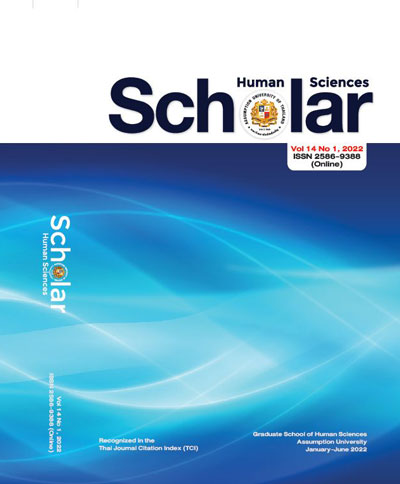A COMPARATIVE STUDY OF GRADE 5 STUDENTS’ WORD STRESS COMPETENCE UNDER MULTISENSORY AND LISTEN AND REPEAT TEACHING APPROACHES IN ENGLISH AS A FOREIGN LANGUAGE CLASS AT A PUBLIC SCHOOL IN BANGKOK, THAILAND
Keywords:
word stress competence, multisensory teaching approach, listen and repeat, English, Bangkok, ThailandAbstract
This study aimed to determine the level of word stress competence of Grade 5 English as a foreign language students taught through multisensory and listen and repeat teaching approaches and to determine whether there was a significant difference in the gain in word stress competence from the pre-test to the post-test among students taught through multisensory and listen and repeat teaching approaches in English as a foreign language class at a public school in Bangkok, Thailand. The research was a quasi-experimental study conducted on two groups in which one group was the experimental group (Class 5/2) using the multisensory teaching approach and the other group was the control group (Class 5/1) using listen and repeat teaching approach, in the 2019 academic year. The research instrument utilized was the pre-post test of word stress competence developed by the researcher. The scores were analyzed by means, standard deviations and an independent samples t-test (two-tailed). The findings of the study revealed a significant difference in the gain in word stress competence from the pre-test to the post-test between students in the experimental and control groups. Students taught through the multisensory approach achieved higher than the students taught through the listen and repeat teaching approach. Recommendations are provided for the school, teachers and future researchers.
References
Armstrong, T. (2009). Multiple Intelligences in the Classroom (3rd ed.). Alexandria, VA: Association for Supervision & Curriculum Development.
Celce-Murcia, M., Brinton, D. M., & Goodwin, J.M. (1996). Teaching pronunciation: A reference for teachers of English to speakers of other languages. New York: Cambridge University Press.
Chan, M. J. (2018). Embodied pronunciation learning: research and practice. The CATESOL journal, 30(1), 47-68.
Cherry, K. (2019, June 4). What is operant conditioning and how does it work?. Retrieved from https://www.verywellmind.com/operant-conditioning-a2-2794863
Crystal, D. (2003). English as a global language (2nd ed.). United Kingdom: Cambridge University Press.
Darasawang, P. (2007). English language teaching and education in Thailand: A decade of change. In D. Prescott (Ed.), English in southeast asia: Varieties, literacies and literatures (pp. 187-204). Newcastle: Cambridge Scholars Publishing.
Gardner, H. (1983). Frames of mind: the theory of multiple intelligences. New York: Basic Books.
Hymes, D. H. (1972). On communicative competence. In J.B. Pride & J. Holmes (Eds.). Sociolinguistics: selected readings (pp. 269-293). Harmondsworth: Penguin.
Jindathai, S. (2015). Factors affecting English speaking problems among engineering students at Thai-Nich institute of technology. TNI Journal of Business Administration and Languages, 3(2), 26-30.
Kanoksilapatham, B. (2014). Thai elementary school teachers' English pronunciation and effects of teacher variables: Professional development. TESL-EJ, 18, 1-13.
Khamkhien, A. (2010). Thai learners' English pronunciation competence: lesson learned from word stress assignment. Journal of language teaching and research, 1(6) 757-764.
McLeod, S. A. (2007). Skinner-operant conditioning. Retrieved from https://www.academia.edu/22600985/Skinner_-Operant_Conditioning
Mirzaei, F., Jahandar, S., & Khodabandehlou, M. (2014). The effect of multiple intelligences on Iranian EFL learners’ pronunciation accuracy at intermediate level. Indian Journal of Fundamental and Applied Life Sciences, 4(2), 488-495.
Narksompong, J. (2007). A study of Thai phonological features that cause pronunciation problems for Thai people (Unpublished master’s thesis). Thammasat University, Bangkok, Thailand.
Odisho, E. Y. (2007). A multisensory, multicognitive approach to teaching
pronunciation. Linguística - Revista de Estudos Linguísticos da Universidade do
Porto. 2(1), 3-28.
Oksanen, P. (2016), A multisensory pronunciation teaching intervention in a Finnish EFL context (Unpublished master’s thesis).
Punthumasen, P. (2007). International programme for teacher education: an
approach to tackling problems of English education in Thailand. Paper presented at the 11th UNESCO-APEID international conference reinventing higher education: toward participatory and sustainable development, Bangkok, Thailand.
Richards, J. C. (2006). Communicative language teaching today. New york: Cambridge University Press.




